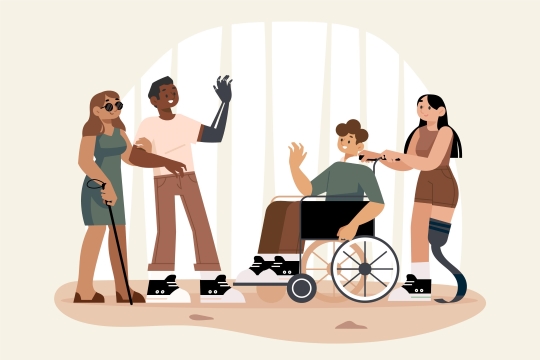Because there are too few PhD candidates with an occupational disability at VU Amsterdam, the university is going to subsidise ten PhD positions. ‘We need to focus on opportunities and less on limitations.’
Student advisers, lecturers, support staff: VU Amsterdam currently has filled 106 jobs for the most vulnerable group on the labour market: people with an occupational disability. But the academic field is lagging behind, says PhD candidate Evelien Wolf. “This is not only true at VU, I think this is true for every university. That is why we set up this initiative, which allows people with an occupational disability to pursue a career in science.”
Wolf knows what it’s like to do a PhD with an occupational disability. She uses an electric wheelchair due to a spinal cord injury. “Sometimes what someone needs can be very simple. I mainly need physical adjustments, other than that I can just work my contract hours and do my job. What I can’t manage is to pull multiple all-nighters in a row, something many PhD candidates do. And sometimes I have to deal with unexpected circumstances, such as problems with health care. It is important for a PhD supervisor to have sufficient help in how to arrange adjustments. That support is something I’m going to provide.”
Bonus year
Besides the support, VU also provides funding that covers the PhD candidate’s salary for one year. “That grant serves as an incentive to just give it a try. After a year, we decide whether the PhD candidate may continue. If it doesn’t work out, the supervisors won’t lose their own funding. Together with the supervisor and the PhD candidate, I also look at the goals and how achievable they are. For example: does the supervisor have realistic expectations of what the PhD candidate can do? That’s a conversation we can also have upfront, to check whether all preconditions are in place and whether it can be a successful trajectory.”
Misunderstandings
But why are there so few PhD candidates with an occupational disability? Wolf: “There are a lot of misunderstandings among promoters, who have a certain idea of what a PhD position should look like and who is the best candidate. They then often opt for the easiest choice, someone they think will do well. Literature shows that many employers believe that people with disabilities are often late or absent. This does not have to be the case at all, but these are misconceptions that are in people’s heads.”
‘It’s also good for science, you come to different solutions if you’re with a diverse group of people’
Wolf mentions that she thinks it is important that promoters do not join this programme just because they care about people with disabilities. “It’s also good for science because you come to different solutions if you’re with a diverse group of people.” According to Renée van Scheppingen, coordinator of the overarching Participation Service Point, the mission of the initiative is to focus more on opportunities and less on limitations. “A promoter should hire someone because they can do something and not because they have a disability. It would be an eternal waste to leave certain qualities and talents on the bench.”
